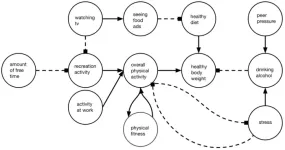(Press-News.org) When people have to make a tough decision, their first instinct is usually to gather as much information as possible. Just one problem: according to research published this week in Cognitive Research: Principles and Implications, most people’s decision-making actually gets worse, not better, when you give them additional facts and details.
“It’s counterintuitive, because we all like to think we use information wisely to make smart decisions,” said Farber Chair Associate Professor Samantha Kleinberg, the paper’s lead author and a computer scientist at Stevens Institute of Technology. “But the reality is that when it comes to information, more isn’t necessarily better.”
To study how people make decisions, researchers typically create simple diagrams — or causal models — that show how different factors logically interact with each other to yield specific outcomes. When it comes to describing abstract hypothetical scenarios, like how aliens square off at a dance party, most people can reason effectively about such models because they do not have any biases or preconceptions about alien dance-offs. People make good decisions because they focus on the information that they are given.
But Kleinberg’s work shows that when it comes to everyday scenarios, like figuring out how to make healthy decisions around nutrition, for example, people’s ability to reason effectively all but evaporates. “We think people’s prior knowledge and beliefs distracts them from the causal model in front of them,” explained Kleinberg. “If I’m reasoning about what to eat, for instance, I might have all kinds of preconceptions about the best things to eat — and that makes it harder to effectively use the information that I’m presented.”
To verify that hypothesis and building upon their 2020 study, Kleinberg and co-author Jessecae Marsh, a cognitive psychologist at Lehigh University, conducted a series of experiments exploring how people’s decision-making varies when they’re presented with different kinds of causal models across a wide range of real-life topics, from buying a house and managing body weight to picking a college and increasing voter turnout. It quickly became apparent that people know how to use causal models but even a very simple model quickly became all but useless when just a little additional detail, beyond the information that’s strictly necessary to make a good decision, is added to the mix.
“What’s really remarkable is that even a tiny amount of surplus information has a big negative effect on our decision-making,” said Kleinberg. “If you get too much information, your decision-making quickly becomes as bad as if you’d gotten no information at all.”
If a causal model shows that eating salty food raises your blood pressure, but also shows extraneous information such as drinking water makes you less thirsty, for instance, it becomes much harder for people to make effective choices about the best way to maintain their health. When Kleinberg’s team highlighted the salient causal information, however, people’s ability to make good decisions quickly returns.
“That’s significant because it shows that the problem isn’t just that people are overwhelmed by the sheer quantity of information — it’s more that they’re struggling to figure out which parts of the model they should be paying attention to,” said Kleinberg.
This work has significant implications in fields like public health because it means that educational messages need to be simmered down to their most essential parts and carefully presented in order to have a positive impact. “If you’re giving people a laundry list of things to consider when they’re deciding whether to wear a facemask or get a COVID test, or what to eat or drink, then you’re actually making it harder for them to make good decisions,” said Kleinberg.
Even when Kleinberg and Marsh gave participants the option of receiving more or less information, those who asked for more information made poorer decisions than those who asked for less. “If you give people the opportunity to overthink, even when they ask for additional information,” said Kleinberg, “things go poorly. People need simple and carefully targeted causal models in order to make good decisions.”
One approach to aid decision-making might be to use AI chatbots to tailor health information or nutritional advice to individuals on a case-by-case basis — essentially feeding a complex causal model into the AI model, and letting it detect and highlight only the specific information that’s most relevant to a particular individual.
END
Want to make better decisions? Ask for less information, not more
Even small amounts of surplus information can derail the ability to make good decisions, according to new research at Stevens Institute of Technology
2023-09-27
ELSE PRESS RELEASES FROM THIS DATE:
HMS researcher to lead $104 million federal project tackling antibiotic resistance
2023-09-27
At a glance:
Johan Paulsson, HMS professor of systems biology, will lead project studying bacterial behavior and antibiotic resistance.
Efforts will focus on developing technology to improve diagnosis, speed discovery of new antibiotics, and illuminate basic mechanisms of bacterial behavior.
Harvard Medical School researcher Johan Paulsson will lead a multi-institutional $104 million effort to study bacteria and antibiotic resistance, the U.S. Department of Health and Human Services announced today.
The work is funded by the newly established Advanced Research Projects Agency for Health (ARPA-H) in an ...
Study provides new look at why rare cancer often evades treatments
2023-09-27
BOSTON - Researchers at Boston Medical Center and Dana-Farber Cancer Institute conducted one of the first-ever analyses of neuroendocrine tumors (NETs) at single cell resolution, unlocking new insights into this rare and often hard-to-treat cancer. The findings represent a tremendous leap forward in understanding why these tumors are largely resistant to immunotherapy and provide key insights that could lead to future treatments.
“This study was a tour-de-force that catalyzed the efforts and innovations of researchers across Boston – including Boston Medical Center and Dana-Farber Cancer Institute - and has resulted in a better understanding ...
Opportunities to improve lung cancer care for older patients
2023-09-27
“With the majority of lung cancer patients being older than 65, it is imperative that actions are taken to encourage and facilitate clinical trials among older patients.”
BUFFALO, NY- September 27, 2023 – A new editorial paper was published in Aging (listed by MEDLINE/PubMed as "Aging (Albany NY)" and "Aging-US" by Web of Science) Volume 15, Issue 17, entitled, “Promising trends in lung cancer care, but are we overlooking the majority?”
In their new editorial, ...
Reassessing COVID-19 precautions in 2023
2023-09-27
“The balance between appropriate precautions and the harm of social isolation always requires a thorough appraisal.”
BUFFALO, NY- September 27, 2023 – A new editorial paper was published in Oncotarget's Volume 14 on September 22, 2023, entitled, “Reassessing the risks and benefits of COVID-19 precautions in 2023.”
The COVID-19 pandemic has killed over one million Americans with many dying during the Omicron wave. By now most Americans have either had COVID-19 and/or been vaccinated against it. Despite the availability of updated immunizations, only 16.7% of Americans are now up-to-date on bivalent ...
Is a longer reproductive lifespan good for your brain?
2023-09-27
EMBARGOED FOR RELEASE UNTIL 4 P.M. ET, WEDNESDAY, SEPTEMBER 27, 2023
MINNEAPOLIS – People with a higher cumulative estrogen exposure throughout their life may have a lower risk of cerebral small vessel disease, according to a new study published in the September 27, 2023, online issue of Neurology®, the medical journal of the American Academy of Neurology.
Cerebral small vessel disease, a form of cerebrovascular disease, results from damage to small blood vessels in the brain. It raises the risk of cognitive impairment and dementia.
“Previous research has shown that rates of cerebrovascular disease increase after menopause, which is often attributed ...
Exposure to air pollution linked to increased risk of stroke within 5 days
2023-09-27
EMBARGOED FOR RELEASE UNTIL 4 P.M. ET, WEDNESDAY, SEPTEMBER 27, 2023
MINNEAPOLIS – Short-term exposure to air pollution may be linked to an increased risk of stroke, according to a meta-analysis published in the September 27, 2023, online issue of Neurology®, the medical journal of the American Academy of Neurology. Short-term exposure was defined as occurring within five days of the stroke.
“Previous research has established a connection between long-term exposure to air pollution and an increased risk of stroke,” said study author Ahmad Toubasi, MD, of the University of Jordan in Amman. “However, the correlation between short-term ...
Microplastics are found in cave water and sediment, says SLU research
2023-09-27
In two recent papers, Saint Louis University researchers report finding high concentrations of microplastics present in a Missouri cave system that had been closed to human visitors for 30 years.
Elizabeth Hasenmueller, Ph.D., associate professor of Earth and Atmospheric Sciences and associate director of the WATER Institute at SLU, and her team published findings in the journals, Science of the Total Environment and Water Research, finding significant microplastic levels in Cliff Cave in Saint Louis County, Missouri.
The research, which originated from Hasenmueller’s research group and Karst Hydrology class, allowed students on the ...
Genetic variation with MASLD reveals subtypes and potential therapeutic avenues
2023-09-27
An astounding 30% of Americans currently have metabolic dysfunction-associated steatotic liver disease, or MASLD, which is formerly known as nonalcoholic fatty liver disease, or NAFLD.
And many are unaware that they have it.
Over time, MASLD can lead to cirrhosis, liver failure and even liver cancer. The disease is also associated with and might be caused by factors that contribute to obesity, diabetes, high cholesterol and heart disease.
“Many people are not aware that MASLD can also be a sign of another condition, like diabetes or cardiovascular disease,” said Elizabeth Speliotes, M.D., Ph.D., M.P.H., gastroenterologist at Michigan Medicine ...
Expert: The current pace of decarbonization in Massachusetts is too low to meet climate goals
2023-09-27
Media contacts:
Emily Gowdey-Backus, director of media relations, Emily_GowdeyBackus@uml.edu
Nancy Cicco, assistant director of media relations, Nancy_Cicco@uml.edu
Having worked with renewables for the last 15 years, and listening to the lofty goals political leaders make to achieve net-zero carbon emissions, UMass Lowell mechanical engineering Professor Christopher Niezrecki can tell you that as a state and a nation, we’re not on track. It’s not easy to wrap one’s head around the scale of the problem and even harder to come up with viable solutions. There is global scientific consensus that ...
Department of Energy announces $30 million for research to accelerate scientific advances at user facilities
2023-09-27
WASHINGTON, D.C. - Today, the U.S. Department of Energy (DOE) announced $30 million in funding for three projects to increase scientific productivity and discoveries across DOE light source, neutron source, and high-performance computing and networking facilities.
The DOE Office of Science provides researchers with access to the most advanced tools of modern science. The awarded projects are focused on developing the computational mathematics and scientific computing research needed to accelerate discovery and innovation at DOE’s X-ray and neutron source user facilities.
“Scientific research is becoming ever more dependent on complex data ...
LAST 30 PRESS RELEASES:
Of crocodiles, counting and conferences
AERA announces 2026 award winners in education research
Saving two lives with one fruit drop
Photonic chips advance real-time learning in spiking neural systems
Share of migratory wild animal species with declining populations despite UN treaty protections worsens from 44% to 49% in two years; 24% face extinction, up 2%
One in 20 babies experiences physical abuse, global review finds
Tundra tongue: The science behind a very cold mistake
Targeting a dangerous gut infection
Scientists successfully harvest chickpeas from “moon dirt”
Teen aggression a warning sign for faster aging later in life
Study confirms food fortification is highly cost-effective in fighting hidden hunger across 63 countries
Special issue elevates disease ecology in marine management
A kaleidoscope of cosmic collisions: the new catalogue of gravitational signals from LIGO, Virgo and KAGRA
New catalog more than doubles the number of gravitational-wave detections made by LIGO, Virgo, and KAGRA observatories
Antifibrotic drug shows promise for premature ovarian insufficiency
Altered copper metabolism is a crucial factor in inflammatory bone diseases
Real-time imaging of microplastics in the body improves understanding of health risks
Reconstructing the world’s ant diversity in 3D
UMD entomologist helps bring the world’s ant diversity to life in 3D imagery
ESA’s Mars orbiters watch solar superstorm hit the Red Planet
The secret lives of catalysts: How microscopic networks power reactions
Molecular ‘catapult’ fires electrons at the limits of physics
Researcher finds evidence supporting sucrose can help manage painful procedures in infants
New study identifies key factors supporting indigenous well-being
Bureaucracy Index 2026: Business sector hit hardest
ECMWF’s portable global forecasting model OpenIFS now available for all
Yale study challenges notion that aging means decline, finds many older adults improve over time
Korean researchers enable early detection of brain disorders with a single drop of saliva!
Swipe right, but safer
Duke-NUS scientists identify more effective way to detect poultry viruses in live markets
[Press-News.org] Want to make better decisions? Ask for less information, not moreEven small amounts of surplus information can derail the ability to make good decisions, according to new research at Stevens Institute of Technology



